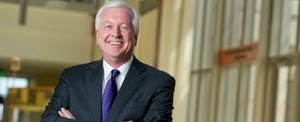My reading life: Jeffrey Bergstrand
Published: August 26, 2014 / Author: Christine Cox

Jeffrey Bergstrand doesn’t clearly remember reading stock
prices in the newspaper as a very young boy, but his mother said he was
fascinated. Little did she know that this childhood interest would grow into a
renowned career studying the world economy.
A finance professor and associate dean for graduate programs
at the Mendoza College of Business, Bergstrand has taught macroeconomics for 28
years and currently instructs Notre Dame MBA and Notre Dame Executive MBA
students in South Bend and Chicago.
If Bergstrand’s reading life started with stock prices, it
has expanded to a range of publications about international trade and
investment, presidential biographies and an occasional novel, as he explains in
this Q&A.
What are you reading
now?
Because I am still an active researcher, I devote most of my
reading time to published and unpublished scholarly articles in my area.
However, in my spare time, I try to read books.
I’ve been reading Power
and Plenty: Trade, War, and the World Economy in the Second Millennium by
Ronald Findlay and Kevin H. O’Rourke. It looks at the development of world
trade over the last 2,000 years and gives fascinating historical context. I’ve
been working on it for a year now; it can be a bit dry. I come back to it when
I can’t sleep at night.
I’m also about to start reading Thomas Jefferson’s actual writings.
I love reading presidential biographies. They not only help me understand the
history of this country economically and politically, but they also are
valuable for me in my role of associate dean for graduate programs. It helps me
understand more about great leaders. I’ve recently read biographies on George Washington,
John Adams, Thomas Jefferson and Andrew Jackson.
The four-volume collection of Jefferson’s works that I’m
going to read is called Memoirs,
Correspondence, and Miscellanies from the Papers of Thomas Jefferson, which
was edited by Jefferson’s grandson Thomas Jefferson Randolph in the 1800s. I
just came back from visiting my godmother in Los Angeles, who has a wonderful
book collection. She gave me these Jefferson volumes as a gift. They’re old and
the covers are deteriorating, but I’m looking forward to reading Jefferson’s
own writing.
Which presidential
biography spoke to you most?
My favorite so far is Washington:
A Life by Ron Chernow, which won the Pulitzer Prize for biography in 2011.
It really impressed me because it drew out the character of Washington as a
leader and how he became father of this country. It wasn’t so much through his
military acumen — for which he was probably modest at best — it was how he was
able to lead this ragtag continental army with a hodgepodge of military
resources to carry things out.
One of the most stirring times in American history was the
hardship at Valley Forge during the winter of 1777. Visiting Valley Forge with
my son helped me understand the immense dire conditions. The soldiers were
given IOUs instead of pay and still stayed on because of Washington. He was
such a motivational force and was truly loved by the soldiers. He had a vision
for what they could do and what their potential was. He brought out the best in
them, even under extraordinarily dire conditions.
What do you read to
keep up on the economy?
My first job after earning my PhD was with the Federal
Reserve System. I spent five years with the Federal Reserve Bank of Boston. So
I often read Federal Reserve publications because I used to write them. The
Federal Reserve posts good economics notes online and I read those. I read The Economist magazine, because it’s a
great way to keep up on the world economy, world politics and what’s going on
in the world in general. And I read the major newspapers, The New York Times, The Wall
Street Journal and the Financial
Times.
By teaching global
economics in all of your classes, you have spurred a lifelong interest for many
alums. What are some relevant publications for alums interested in keeping
current with global economics?
I go back to The Economist
because it’s well balanced and moderate. It’s not pure capitalism or pure socialism;
it’s somewhere in between, as most industrial economies are. And it is very
good on its economic analysis without being technical. The Economist gives you constant doses of reality for the global
economy.
For those interested in a little more depth on the world
economy, the International Monetary Fund (IMF) puts out its World Economic Outlook online every six
months. It’s not technical and it’s probably the best forecast out there. It’s quite
readable for anybody who’s had macroeconomics at the undergraduate, MBA level
or EMBA level.
What are some of your
favorite books?
Due to time constraints, I don’t read as much fiction these
days, but two works of fiction are old favorites. The first is The World According to Garp by John
Irving. I have enjoyed several of Irving’s books. I read Garp years ago, but still remember a lot of specific parts. One
line that I especially remember is “Watch out for the undertow,” a warning to
beware of lurking potholes.
Franz Kafka’s Metamorphosis
was a really great book. I think I was taking a college writing class when I
read it. I thought it was brilliant, the very surreal concept of waking up as
an insect. But what made an impact on me was Kafka’s ability to make that very
surreal context seem real. In some of my fictional writing in college, I would try
to do that myself. It was an interesting way to stretch my imagination.
/news_and_events/news_articles/article/14631/my-reading-life-jeffrey-bergstrand




